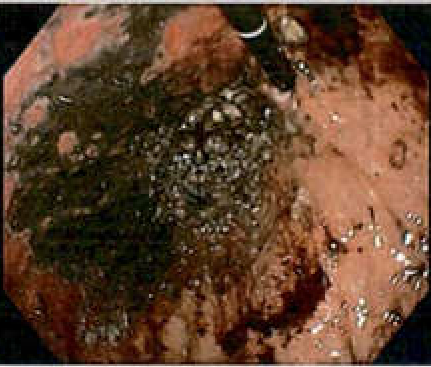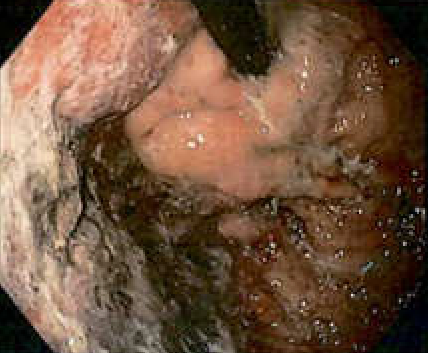Tuesday Poster Session
Category: Stomach and Spleen
P6348 - Severe Gas Bloat Syndrome and Gastric Necrosis: A Rare Complication of Toupet Fundoplication
Tuesday, October 28, 2025
10:30 AM - 4:00 PM PDT
Location: Exhibit Hall
- HN
Hao The Nguyen
Rocky Vista University
waldorf, MD
Presenting Author(s)
Hao The Nguyen, 1, Tudor Oroian, MD2
1Rocky Vista University, Colorado Springs, CO; 2Evans Army Community Hospital, Colorado Springs, CO
Introduction: Laparoscopic fundoplication is a commonly utilized surgical technique in the management of gastroesophageal reflux disease (GERD), with Nissen (360°) and Toupet (270° partial posterior) techniques typically used. Toupet fundoplication is often preferred for its lower rates of postoperative dysphagia and gas-related complications. Gas bloat syndrome (GBS), characterized by bloating, epigastric fullness, and flatulence, is more frequently seen after Nissen fundoplication but is an exceedingly rare complication following Toupet procedures. Severe GBS can result in acute gastric dilation and ischemia, which carries a mortality rate of up to 73%. We present a rare case of GBS complicated by gastric necrosis following Toupet fundoplication.
Case Description/
Methods: A 42-year-old male with a history of Toupet fundoplication presented with acute abdominal pain. CT imaging revealed marked gastric distention without evidence of perforation. Esophagogastroduodenoscopy (EGD) showed copious gastric fluid and particulate matter requiring prolonged lavage. Endoscopic inspection revealed black, necrotic-appearing mucosa involving 30–40% of the fundus, cardia, and lesser curvature, with surrounding erythematous but viable tissue. No perforation was seen, and the fundoplication wrap appeared intact and perfused. Due to concerns for ischemia, biopsies were deferred, and a nasogastric tube was endoscopically placed for decompression. On repeat EGD the following day, significant mucosal improvement was observed, with residual erythema and granularity suggestive of reperfusion. Persistent debris in the antrum and pylorus suggested possible underlying gastroparesis, so 200 units of botulinum toxin were injected into the pylorus to aid with this. The patient improved and was discharged seven days later without complications.
Discussion: Even though GBS is a complication that is more commonly associated with Nissen fundoplication, it is important to remain vigilant in patients that undergo Toupet procedures as well. GBS is still a rare, potential complication that can lead to severe outcomes, such as gastric necrosis. Early recognition of this condition and prompt decompression are important in order to prevent irreversible injury. In cases complicated by delayed gastric emptying, clinicians can consider pyloric botulinum toxin injections or performing gastric emptying scans prior to surgery.

Figure: Endoscopic view of necrotic gastric mucosa

Figure: Endoscopic view of improved gastric mucosa
Disclosures:
Hao The Nguyen indicated no relevant financial relationships.
Tudor Oroian indicated no relevant financial relationships.
Hao The Nguyen, 1, Tudor Oroian, MD2. P6348 - Severe Gas Bloat Syndrome and Gastric Necrosis: A Rare Complication of Toupet Fundoplication, ACG 2025 Annual Scientific Meeting Abstracts. Phoenix, AZ: American College of Gastroenterology.
1Rocky Vista University, Colorado Springs, CO; 2Evans Army Community Hospital, Colorado Springs, CO
Introduction: Laparoscopic fundoplication is a commonly utilized surgical technique in the management of gastroesophageal reflux disease (GERD), with Nissen (360°) and Toupet (270° partial posterior) techniques typically used. Toupet fundoplication is often preferred for its lower rates of postoperative dysphagia and gas-related complications. Gas bloat syndrome (GBS), characterized by bloating, epigastric fullness, and flatulence, is more frequently seen after Nissen fundoplication but is an exceedingly rare complication following Toupet procedures. Severe GBS can result in acute gastric dilation and ischemia, which carries a mortality rate of up to 73%. We present a rare case of GBS complicated by gastric necrosis following Toupet fundoplication.
Case Description/
Methods: A 42-year-old male with a history of Toupet fundoplication presented with acute abdominal pain. CT imaging revealed marked gastric distention without evidence of perforation. Esophagogastroduodenoscopy (EGD) showed copious gastric fluid and particulate matter requiring prolonged lavage. Endoscopic inspection revealed black, necrotic-appearing mucosa involving 30–40% of the fundus, cardia, and lesser curvature, with surrounding erythematous but viable tissue. No perforation was seen, and the fundoplication wrap appeared intact and perfused. Due to concerns for ischemia, biopsies were deferred, and a nasogastric tube was endoscopically placed for decompression. On repeat EGD the following day, significant mucosal improvement was observed, with residual erythema and granularity suggestive of reperfusion. Persistent debris in the antrum and pylorus suggested possible underlying gastroparesis, so 200 units of botulinum toxin were injected into the pylorus to aid with this. The patient improved and was discharged seven days later without complications.
Discussion: Even though GBS is a complication that is more commonly associated with Nissen fundoplication, it is important to remain vigilant in patients that undergo Toupet procedures as well. GBS is still a rare, potential complication that can lead to severe outcomes, such as gastric necrosis. Early recognition of this condition and prompt decompression are important in order to prevent irreversible injury. In cases complicated by delayed gastric emptying, clinicians can consider pyloric botulinum toxin injections or performing gastric emptying scans prior to surgery.

Figure: Endoscopic view of necrotic gastric mucosa

Figure: Endoscopic view of improved gastric mucosa
Disclosures:
Hao The Nguyen indicated no relevant financial relationships.
Tudor Oroian indicated no relevant financial relationships.
Hao The Nguyen, 1, Tudor Oroian, MD2. P6348 - Severe Gas Bloat Syndrome and Gastric Necrosis: A Rare Complication of Toupet Fundoplication, ACG 2025 Annual Scientific Meeting Abstracts. Phoenix, AZ: American College of Gastroenterology.
